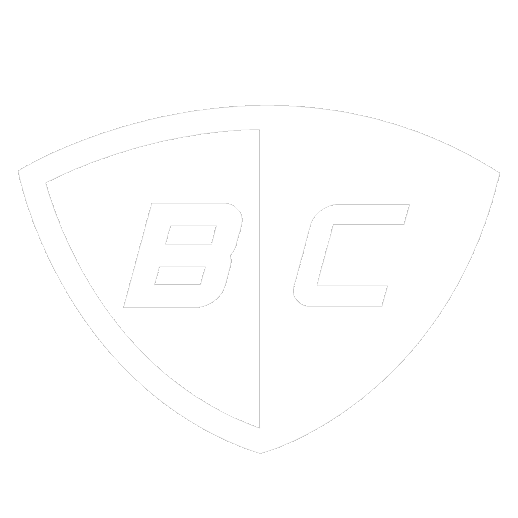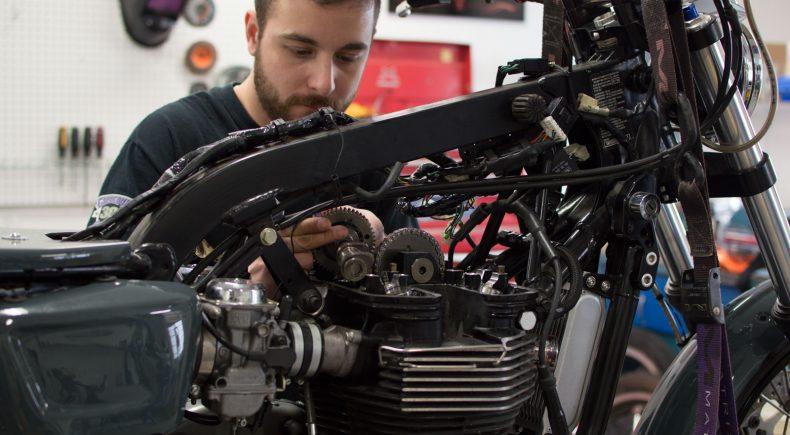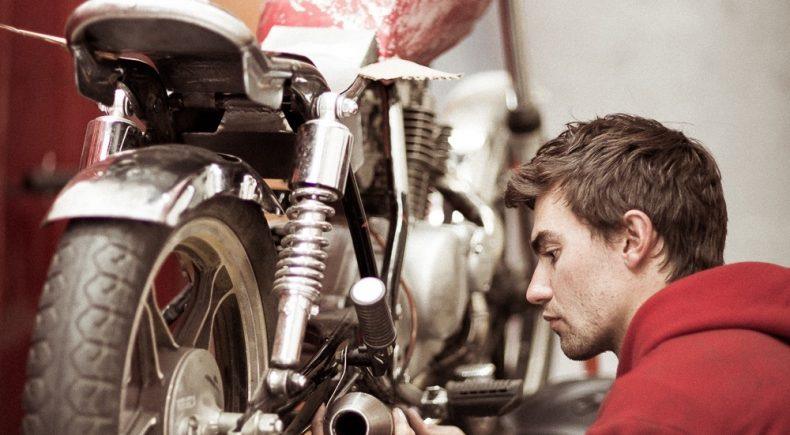
Paul Miller is the founder of PanicRev Customs. His first build was a tracker made from a ’77 Yamaha TT500 that was featured in BikeEXIF, which launched his career. He was invited by Thor Drake of See See Motorcycles to put his latest custom motorcycle on display at the 2016 One Moto Show in Portland, OR.
British Customs: How did PanicRev Customs get started?
Paul Miller: PanicRev grew out of the success I had with the Tracker I built from the ’77 Yamaha TT500. I had been racing in motocross, but wanted to get into flat track racing in my hometown. I was really into it but didn’t know much about it, so I started doing some research. Which is when I discovered street trackers, and it was huge to me. The 500 was a basket case I got for a couple hundred dollars, but I knew I could turn it into something if I spent a little time getting it into shape. I started buying parts for it and putting them on, but I was inspired to start machining the parts I actually wanted on it. I started custom fabbing everything that went on it, even painting it, and as the project came together it turned out I was making a show bike. People told me I had to start doing something with this, so I did. I took the term “panic rev” from my experience in motocross, and when the Tracker was done I called it the first PanicRev Custom. It was amazing to get to do this, because I always had a dream to build parts and share bikes with people.
BC: With one build under your belt and another on the way, you’re really in the thick of launching a custom garage. What’s it like?
PM: Right now I’m taking clients with smaller requests while I build my reputation and brand. I’m still trying to put my finger on it. Since I recently sold the Tracker, I’m trying to develop new universal parts to produce and sell, like cafe racer seats, tracker seats, and billet reservoirs. Everything has to be perfect before they can go out the door though. In the meantime, I’m just trying to build bikes and see what I can really do.

I enjoy doing everything on my own, and learning to do a wide range of things. I want to be the best, but I know that takes time.
BC: What do you find inspires your builds?
PM: Everything. Mainly hot rods, specifically pre-war street rods because that’s what I’ve been around my entire life. I love how every detail on them is perfect; they’re even polished underneath. I see that mentality coming out in my builds. I work in the aerospace industry as a turbine technician, so I’m also inspired by aircraft and what goes into them, especially the lock wiring.
BC: Why do you find yourself drawn to all these vintage things?
PM: They just made things cooler back then. No motorcycle or car made today really captures me like the way a vintage bike or car does. Vintage bikes just had more style and character. Their designs don’t have any clutter, they only need four wires to run. Modern bikes are too safe, if you know what I mean, and are covered in extraneous things that detract from what they are at their core. I love to see technology progress, but I hate to see things like Triumph going against their heritage by making their new Modern Classics liquid-cooled.

BC: You’ve made a street tracker and a bobber, which are both very interesting examples of looks versus rideability. What are you thoughts on form and function as a custom motorcycle builder?
PM: Every motorcycle, custom or not, is an issue of form and function or form versus function. With the street tracker, you have a bike that looks the way it does because of what you want to do on it. With a bobber, it’s a different story. The bobber was my father’s bike, and it was a project we worked on together. I had always been a big fan of that style of bike and wanted to make one, but it definitely costs to be cool on a bobber. Bobbers are definitely form versus function. In the end, it’s just a matter of what the client wants.
BC: What are your thoughts on where custom motorcycle scene is going?
PM: It’s getting bigger, which is exciting. What used to be niche terms are now household terms, like cafe racers and bobbers, because of it. A lot of people who would never have been riders are buying bikes and getting into bikes because of it. Shows are also helping it grow because they’re making the scene a super cool and accessible thing to be a part of.

BC: What does it mean to you to be able to do things by hand?
PM: It’s huge for me. I enjoy doing everything on my own, and learning to do a wide range of things. Right now I’m a jack of all trades because there’s so much to learn, so much craft to hone, and it’s difficult because my family has always been into show cars so I know what perfection looks like. It’s difficult to feel like something is good enough, and I want to be the best, but I know that takes time. But I’m cool with taking the time I need to take to get where I want to be.
BC: Where did you learn all the skills necessary to become a custom motorcycle builder?
PM: I’m 100% self taught. I have a day job working in the aerospace industry fixing gas turbines and I have formal training as a millwright, and I apply those experiences and knowledge to what I do. But all the metal shaping, paint, and bodywork comes from reading books, looking around online, and talking to people. I did everything on the Tracker but the upholstery: after I failed to the get the seat right for the seventh time, I figured I should just take it to someone else.

Craftsmanship is a huge thing to me.
BC: What do you ultimately want to do with PanicRev Customs?
PM: I want to get more into online sales and do something generally bigger with a wider audience while still doing things in own shop. Right now I spend my nights plugging away trying to get my parts online to take steps towards that.
BC: If you had to choose, what would be your preferences for a kind of bike to work on?
PM: I’m a huge carburetor guy, and have always liked air-cooled systems for their cleanliness. Craftsmanship is a huge thing to me. But I really want to get into working with EFI systems.

BC: What bike are you bringing to The One Moto Show?
PM: I’m actually bringing the Tracker to the one show. The owner very generously shipped it up to Portland for me so I could feature it in the show. On the bike, I’m particularly proud of the lock wiring, and the ignition and light wiring that runs through the frame via small hoods on the frame. Cleanliness was key in this build. I wanted to go somewhere people hadn’t, and I’m very proud of how it turned out.





Leave a comment
All comments are moderated before being published.
This site is protected by hCaptcha and the hCaptcha Privacy Policy and Terms of Service apply.